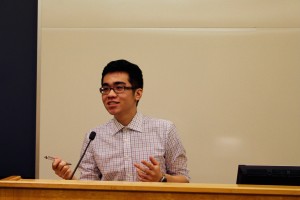For freshman Ana Andrade, the rigid divide between the privileges of being a Harvard student and the struggles of coming from an undocumented family became all too apparent at a time of joy for most college freshmen: move in-day. Driving down JFK Street in the midst of the commotion and bustle of move-in day, Andrade and her family were stopped by a police officer for a minor traffic violation. With no valid US driver’s license, Andrade’s father feared the worst as he sat behind the wheel. The officer knew the situation almost immediately as he asked for the license and registration, and Andrade’s father reluctantly handed him his Brazilian documents. The moments following dripped with tension as the officer examined the invalid documents. The police officer glanced back and forth between the university gates ahead and Ana’s belongings in back of the pick-up truck. He eventually allowed her father to go with just a warning. If it had not been for the Harvard name and the fact that it was move-in day, Andrade says, she is unsure if the officer would have been as lenient; her father might have been arrested and be in the process of immigration hearings at this moment. While most of her peers are only exposed to such issues in news reports or political debates, these fears are a reality for students like Ana, who either have undocumented family members or are undocumented themselves.
Harvard is a dream for most high school students. For undocumented students, however, Harvard is of another dimension, situated in a world not meant for them, a world where they feel they do not belong. Although being a Harvard student does mean one is part of the five percent, many students arrive at school without feeling like our nation’s most privileged. In particular, the handful of undocumented students attending Harvard shares a unique experience, one that starts with the beginning of the college admissions process. Generous financial aid and welcoming policies for undocumented students make Harvard stand out in its admissions outreach; once on campus, undocumented students enjoy their experience but may not encounter as much support.
Getting in the Door
Harvard’s admissions team projects a policy of openness towards undocumented applicants. Undocumented freshman Daishi Tanaka found that Harvard seemed much more welcoming than the other colleges he considered applying to, even peer institutions such as Columbia and Stanford. Tanaka told the HPR he found the simple ability of being able to apply “as a regular student” an important feature of the application process. In addition, Harvard provides financial aid to undocumented students, who are ineligible for federal financial aid and many scholarships due to their legal status. As one of only sixty-two American colleges that provide full financial aid, Harvard has exemplary policies that may even require no student contribution and provide funds for books each semester. However, choosing to apply to Harvard can still be a difficult decision for undocumented students in awe of its name and reputation. Not all undocumented students have the courage to push past the numerous obstacles in their application process.
Junior Enrique Ramirez
Harvard admissions would do well to increase its outreach to potential undocumented applicants. Currently, the admissions website has two FAQs related to being undocumented and lists an appointed faculty liaison as a resource. This openness could be due to the Obama Administration’s Deferred Action for Childhood Arrivals (DACA). DACA allows undocumented children to apply for temporary protection from deportation under the Department of Homeland Security. This type of online information provided by both universities and their students has made researching schools more anonymous and accessible, even since junior Enrique Ramirez’s application process only three years ago. Ramirez told the HPR that he only realized attending Harvard was possible when he saw a news story about an undocumented student facing deportation for using his Harvard ID in an airport. Finding out basic information about the application process can be tedious—Tanaka spent hours calling schools to find out their policies on undocumented students, often encountering schools that simply said they could not help. While other students can focus on filling out the Common App and writing their essays, undocumented students end up spending hours on the phone revealing their most powerful secrets to admissions officers. Currently, the Harvard admissions office has outreach programs such as the Harvard College Connection that reaches out to minority and low-income students. It would do well to extend its outreach programs to include undocumented students specifically, with student liaisons similar to those of the minority and first-generation recruitment programs. The admissions office should make sure undocumented students know that Harvard is an option for them—one that is more welcoming and more affordable than even their state schools.
Fortunately for future applicants, Harvard will soon have a pre-orientation program for undocumented students and others who have similar needs in the transition to college. Currently, Tanaka is on the board for the Freshman Enrichment Program, FEP, a developing pre-orientation program aimed towards students who come from under-resourced backgrounds, such as undocumented students. The development of this program is a first step toward addressing the current void of information or support for students who may not have the experiences or resources that ease the many changes that accompany moving into college. While FEP has yet to be officially introduced to the undergraduate community, Tanaka shared with the HPR that the program will foster supportive relationships with components such as nightly fireside chats to allow students to share their worries. Yale currently already has a pre-orientation program for first generation freshmen, and Ramirez felt disappointed upon realizing that Harvard lacked a counterpart. Creating such a program will mitigate many of the difficulties undocumented students face when adjusting to college.
Freshman Daishi Tanaka
Finding a Home
Once at Harvard, undocumented students must take their own initiatives to find supportive communities. The university’s small undocumented population, which numbers fewer than 50 undergraduates according to Tanaka, may be shortchanged by the university’s policies in this regard. Before matriculating, Tanaka recalled that no member of the administration or student group contacted him with regard to his legal status, so he instead reached out to an undocumented student group himself. Now an active member of Harvard’s Act on a DREAM, an organization that underpins most of the resources for undocumented students, Tanaka feels that Act on a DREAM has been a critical part of his Harvard experience. Despite this, Harvard currently has the Act on a DREAM group listed as a Hispanic/Latino student organization—potentially alienating other undocumented students who come from different ethnicities or cultures. Ramirez has found that in his experience “it’s in the hands of undocumented students” to help each other learn to navigate college. Harvard encompasses a wide range of political leanings and socioeconomic classes, creating a culture shock for students like Ramirez. He counts himself lucky for having attended a diverse high school where he was exposed to some of the many aspects of the college transition that burden freshmen who haven’t experienced such a politically and socially liberal environment.
Being undocumented on campus can color students’ external and internal worlds. President Drew Faust has openly shown her support for the undocumented community, particularly by publicly endorsing the DREAM Act. Since June 2012, DACA makes it easier for undocumented students to share their status without the fear of repercussions. Tanaka finds that being of Asian descent makes his legal status surprising to others, but he has been able to have open discussions with conservative and liberal students alike. Other students may be insensitive to or unaware of the restrictions undocumented students face, which preclude them from studying abroad or applying to overseas opportunities like the Rhodes Scholarship. Not all the personal effects of being undocumented are negative, however; Tanaka finds that his legal status has spurred him to become more politically involved on campus. These aspects of life as an undocumented Harvard student comprise the unique experience that such students call their own.
One the whole, Harvard’s administration provides a supportive environment for undocumented students, starting with the admissions process. Harvard already offers some amazing resources– generous financial aid, a faculty liaison, and the ability to use the same process as an American citizen, to name a few. However, a more publicized and supportive admissions process would help attract undocumented students and make them feel welcome. For undocumented students matriculating to the college, a special pre-orientation program and a stronger undocumented student support network would ease their adjustment. We can only hope that Harvard continues to attract and support undocumented students.

